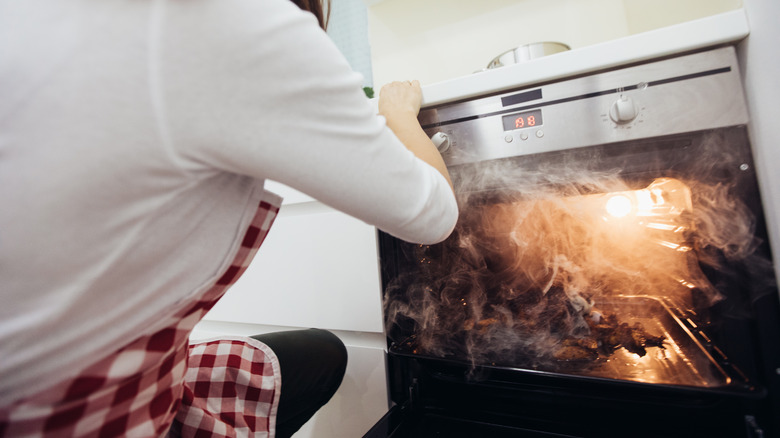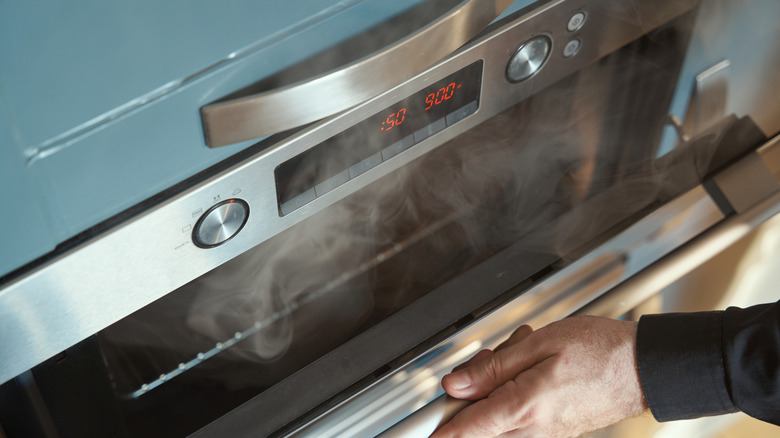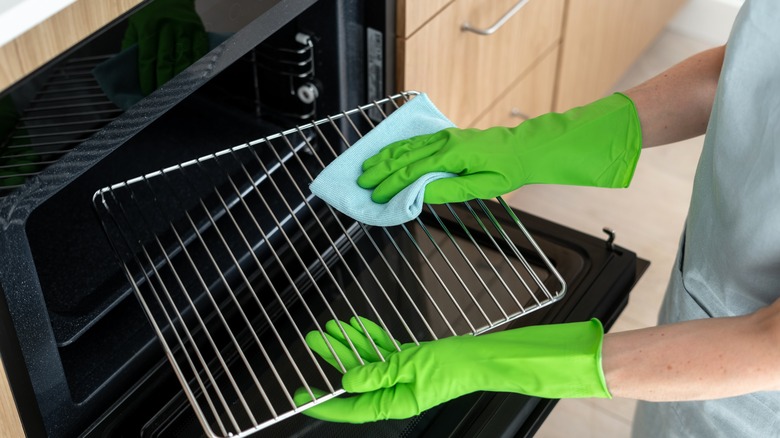Here's How To Safely Handle A Grease Fire In Your Oven
One of the worst nightmares for any person is a kitchen fire, and even with plenty of precautions taken, they can still happen to anyone. According to the U.S. Fire Administration, cooking fires are the leading cause of residential fires. A whopping 45% of recently reported fires were ignited by oil, grease, and fat. That's because the oil we cook with can catch fire somewhat easily, even in a stable cooking environment like the oven. With how common grease fires are, it's incredibly important to be prepared in case of an emergency to protect your family and your home. If you have a grease fire start in your oven, here are the things to keep in mind.
Don't confuse stovetop and oven emergency grease fire guidelines. In the case of an oven grease fire, your first instinct may be to immediately open the oven and remove the blazing source of the fire, but this is a severe mistake, as introducing new air can make the flames even bigger. Instead, leave the oven door shut and simply turn off the heat. The lack of oxygen will snuff out the flames. You may want to use a pair of oven mitts to turn the dial off to prevent burning yourself. If you have a convection oven, be sure to turn off the fan as well. If the flames manage to escape the oven, evacuate yourself and your family from the home immediately and call 911.
What to do after a grease fire in your oven
Once you're certain the flames have died out entirely, you will likely be wondering what to do next. If you are worried the fire may still be going on, it's best to gather up any family members, leave the home, and call the fire brigade in — this is the best course of action if you have any doubts.
Only after you're positive the fire is out or the fire brigade has cleared the scene can you move onto the next steps. You'll likely be left with an oven full of ruined dinner and smoke that will need dealing with. Make sure no children or pets are in the vicinity, and put on a mask and gloves to prevent burns and inhalation of any fine ash particles in the air. Open the windows and turn on your exhaust fan before you open the oven door so the smoke has somewhere to go, rather than lingering in your home. Don't immediately reach for the burnt dinner, either. Even though the flames are gone, things are likely to still be very hot in the oven. After the oven has cooled, you can dispose of the food. Use a hand broom or vacuum to clear away any ash or debris, then use a sponge and water to remove any lingering remnants before cleaning your oven as you normally do.
Why do oven grease fires happen and how can I prevent them?
Grease fires can happen in the oven for a number of reasons. A stray splash of oil might pop into the broiler while it's on, cooking fat can reach a too-high temperature, food and grease spills can catch fire on the bottom of the oven, or a bit of parchment paper can catch fire and ignite the cooking fat.
To prevent oven grease fires from happening, cleaning the oven regularly is important, particularly if food or grease has spilled while cooking or baking. If you notice spill-over while cooking, be sure to clean it up as soon as possible, rather than letting it become a hard-set, sticky, burnt, stain — this is not only safer but will save you from more labor-intensive deep cleans. Prevent spillovers by not overfilling pans and avoid baking and roasting with excess grease. How often you should clean your oven depends on how often you use it, with frequent use requiring more frequent cleanings.
Additionally, it's important to keep an eye on your oven whenever it's in use. Too many have a "set it and forget it" mentality when it comes to the oven, but grease fires can start suddenly, and the sooner you notice it and turn off the heat, the better.


